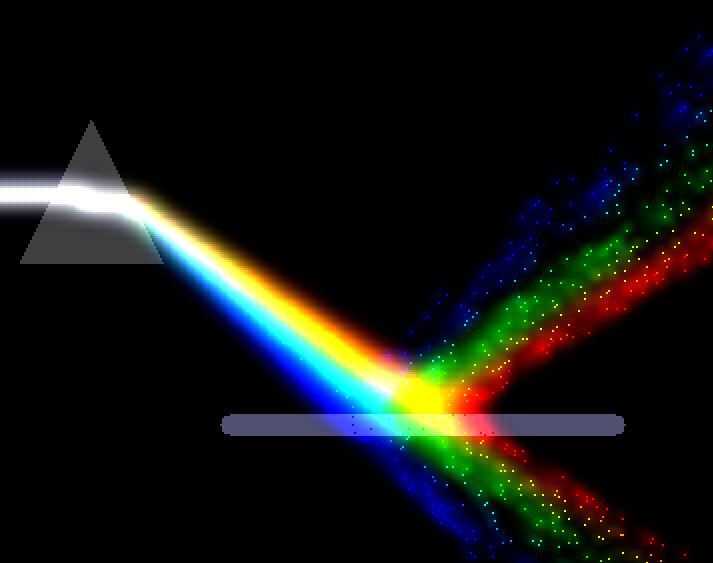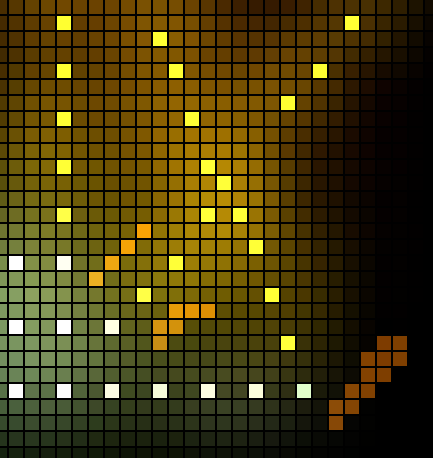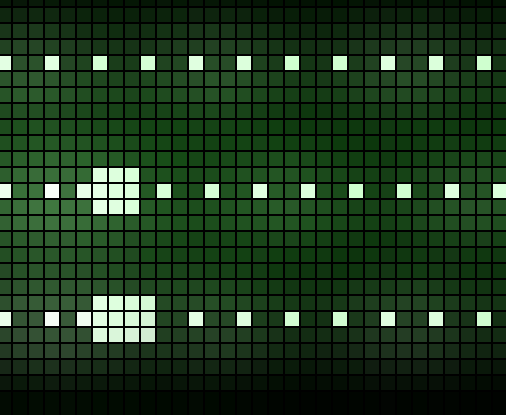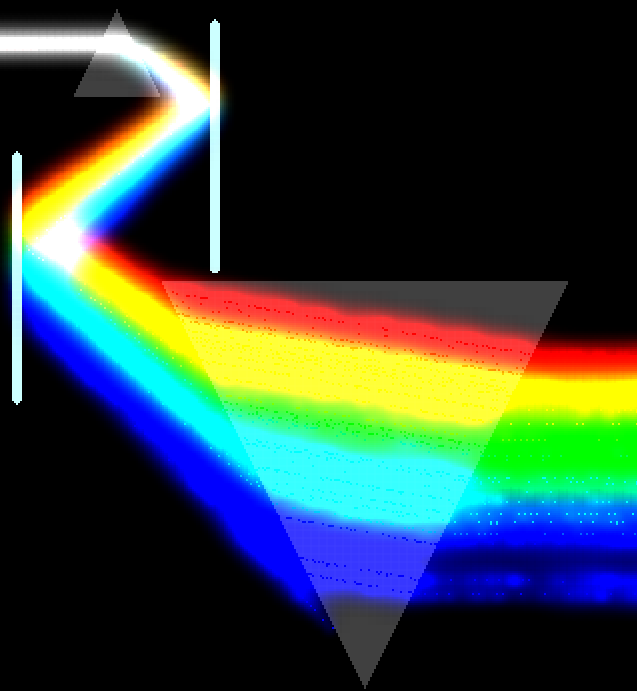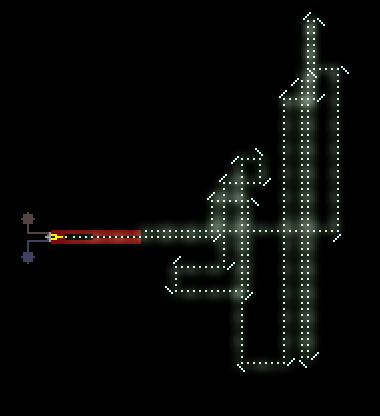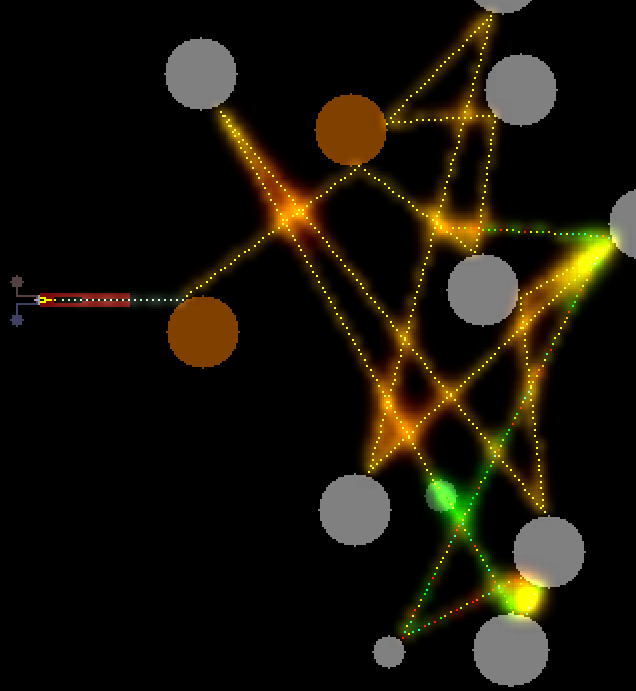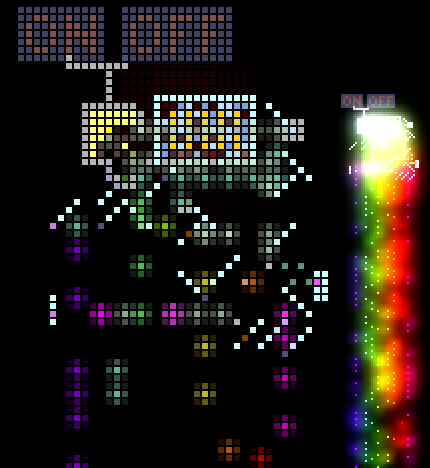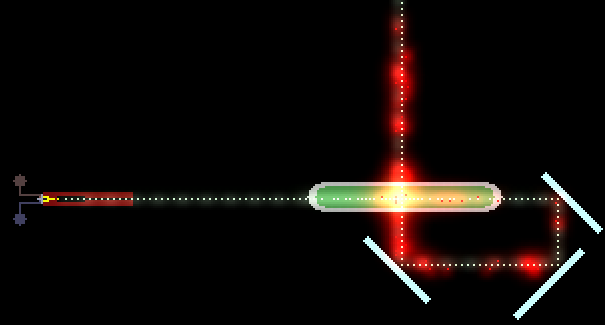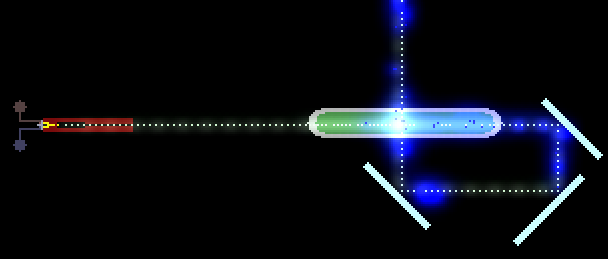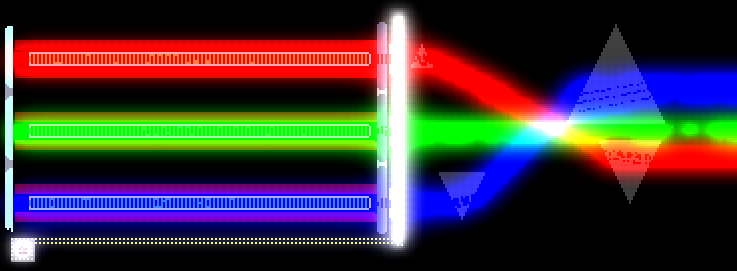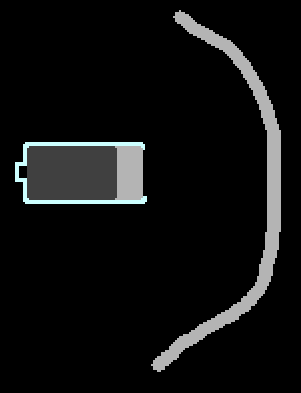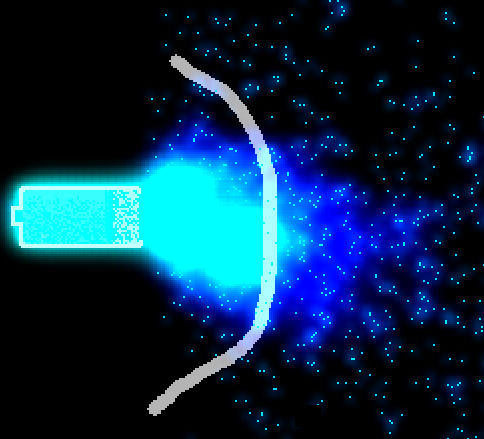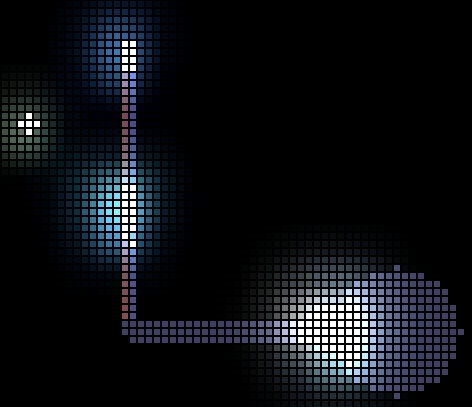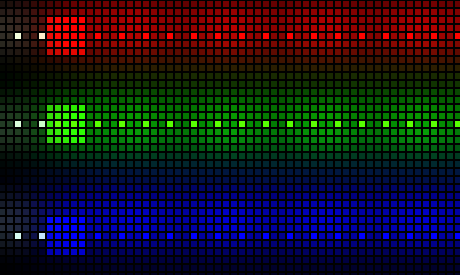Difference between revisions of "Element:PHOT"
Neospector (talk | contribs) (Fixed images) |
m (Enter a short summary [b]) |
||
| (13 intermediate revisions by 10 users not shown) | |||
| Line 1: | Line 1: | ||
| − | + | {{ infobox Element | |
| + | | icon = PHOT.png | ||
| + | | longname = Photons | ||
| + | | image = | ||
| − | + | | identifier = DEFAULT_PT_PHOT | |
| + | | name = PHOT | ||
| + | | description = Refracts through glass, scattered by quartz, and color-changed by different elements. Ignites flammable materials. | ||
| + | | colour = FFFFFF | ||
| + | | menusection = SC_NUCLEAR | ||
| + | | menuvisible = 1 | ||
| + | | advection = 0 | ||
| + | | airdrag = 0 | ||
| + | | airloss = 1 | ||
| + | | loss = 1 | ||
| + | | collision = -0.99 | ||
| + | | diffusion = 0 | ||
| + | | explosive = 0 | ||
| + | | falldown = 0 | ||
| + | | flammable = 0 | ||
| + | | gravity = 0 | ||
| + | | hardness = 0 | ||
| + | | heatconduct = 251 | ||
| + | | hotair = 0 | ||
| + | | meltable = 0 | ||
| + | | state = ST_GAS | ||
| + | | temperature = 1195.15 | ||
| + | | weight = -1 | ||
| + | | properties = TYPE_ENERGY PROP_LIFE_DEC PROP_LIFE_KILL_DEC | ||
| + | | lowtemperature = | ||
| + | | lowtemperaturetransition = | ||
| + | | hightemperature = | ||
| + | | hightemperaturetransition = | ||
| + | | lowpressure = | ||
| + | | lowpressuretransition = | ||
| + | | highpressure = | ||
| + | | highpressuretransition = | ||
| + | }} | ||
| − | + | Travels in straight lines, refracts through glass, scattered by quartz. Ignites flammable substances such as wood and explosives. Usually used as a medium to transfer heat. | |
| + | |||
| + | The colors of PHOT can be changed when passing through {{MaterialBtn|FILT}}. PHOT wavelengths can be split with a prism of {{MaterialBtn|GLAS}}. | ||
| + | |||
| + | When traveling through non-pressurized {{MaterialBtn|INVS}}, PHOT turns into {{MaterialBtn|NEUT}}, which go almost as straight as PHOT. | ||
| + | |||
| + | When traveling through {{MaterialBtn|HYGN}}, PHOT turns into {{MaterialBtn|PROT}}, which goes in the same direction, as well as {{MaterialBtn|ELEC}}, which goes in a random direction. | ||
| + | |||
| + | When traveling through {{MaterialBtn|BIZR}}/{{MaterialBtn|BIZS}}/{{MaterialBtn|BIZG}}, PHOT will turn into {{MaterialBtn|ELEC}}. This makes electron lasers possible. | ||
| + | |||
| + | Also, when traveling through deactivated {{MaterialBtn|GPMP}}, PHOT turns into {{MaterialBtn|GRVT}}. | ||
| + | |||
| + | Photons change color when they bounce off of {{MaterialBtn|URAN}}, {{MaterialBtn|PLNT}}, {{MaterialBtn|PLUT}}, {{MaterialBtn|C-4}}, and other elements. | ||
| + | |||
| + | == How To Use == | ||
| + | |||
| + | In early version of TPT, photons were limited to only eight directions, up down left and right, and diagonal. They only had one color, white, and could transfer heat between themselves while traveling, going several spaces per frame and giving them the ability to travel through thin substances. A lot has happened to them in more recent updates that makes them almost totally different, and a whole lot better. | ||
| + | |||
| + | === Refraction and Transparency === | ||
[[File:Transparency.png]] | [[File:Transparency.png]] | ||
| − | Originally photons could pass through | + | Originally photons could pass through {{MaterialBtn|LCRY}}, {{MaterialBtn|CLNE}}, and {{MaterialBtn|GLAS}}. That's still the same, but as the screenshot displays, glass now changes the direction of incoming and outgoing photons and randomly assigns them a different color and speed. Colors on different parts of the spectrum are reflected at different speeds/angles, and so.. |
| − | |||
[[File:Rainbow1.png]] | [[File:Rainbow1.png]] | ||
| − | Rainbows are possible now. Notice that the bar of | + | Rainbows are possible now. Notice that the bar of {{MaterialBtn|BMTL}} only reflects 50% of the photons that touch it now, while the other half pass through. |
[[File:GNi25.png]] | [[File:GNi25.png]] | ||
Photons now calculate the angle of surfaces they touch, and use that information to determine their new angle, meaning that a photon can change direction while touching a surface depending on pixels that are actually somewhat far away, though the exact distance I can't remember. The pixels it takes this from must at least all touch one another, with some exception (like the diagonals displayed here.) Photons don't check for empty space while calculating angle, so if the pixels wouldn't be found in a flood fill they likely won't affect the end result. Play around with it, you'll see what I mean. | Photons now calculate the angle of surfaces they touch, and use that information to determine their new angle, meaning that a photon can change direction while touching a surface depending on pixels that are actually somewhat far away, though the exact distance I can't remember. The pixels it takes this from must at least all touch one another, with some exception (like the diagonals displayed here.) Photons don't check for empty space while calculating angle, so if the pixels wouldn't be found in a flood fill they likely won't affect the end result. Play around with it, you'll see what I mean. | ||
| − | |||
[[File:Photondelay.png]] | [[File:Photondelay.png]] | ||
| − | Because photons move more slowly through substances that are transparent to them, you can use elements like | + | Because photons move more slowly through substances that are transparent to them, you can use elements like LCRY to change the position of traveling photons to better suit your needs. |
| − | + | === Angle and Reflection === | |
[[File:Rainbow2c.png]] | [[File:Rainbow2c.png]] | ||
| − | Because of the way refraction works, if you push photons through an angle of | + | Because of the way refraction works, if you push photons through an angle of GLAS or other solid that is the exact opposite of the previous angle touched, the photons will be moved in the exact direction they started in. |
[[File:Reflection2.png]] | [[File:Reflection2.png]] | ||
| Line 35: | Line 86: | ||
[[File:Reflectionm.png]] | [[File:Reflectionm.png]] | ||
| − | When photons touch an object that has a specific color (besides certain metals), the wavelengths of light that the object does not reflect will no longer appear in the photon that touches it. IE, photons touching | + | When photons touch an object that has a specific color (besides certain metals), the wavelengths of light that the object does not reflect will no longer appear in the photon that touches it. IE, photons touching PLNT turn green, touching LAVA turn red. But if an only-green photon touches LAVA, it's likely to disappear. You can learn more about wavelengths here -> (https://powdertoy.co.uk/Wiki/W/Wavelengths.html). |
| − | |||
[[File:7MfIT.png]] | [[File:7MfIT.png]] | ||
| − | As a result, you can actually make just about any color you want if you know the right combination of element bounces will produce the color you need. Take | + | As a result, you can actually make just about any color you want if you know the right combination of element bounces will produce the color you need. Take Cracker64's tiny rainbow gun for example. |
[[File:Crackerm.png]] | [[File:Crackerm.png]] | ||
| − | + | === Other tricks === | |
[[File:Tir1.png]] | [[File:Tir1.png]] | ||
| − | This is called | + | This is called total internal reflection, when light passes through something and bounces off of its inside. It's easy to do in TPT now, but the tricky part is finding the correct angle to make it happen with. Photons will generally get stuck TIR'ing inside of GLAS if random particles are dropped nearby, even though most of the photons will tend to escape. |
[[File:Glowaccum1.png]] | [[File:Glowaccum1.png]] | ||
| Line 53: | Line 103: | ||
[[File:Glowaccum2.png]] | [[File:Glowaccum2.png]] | ||
| − | + | GLOW particles now have a use besides looking pretty. They augment photons when they pass through them after a preset amount of time (about one second.) The newly created photons will appear to have a preset color, which depends on the exact temperature of the GLOW. It doesn't change the color of already-existing photons, however. It only adds colors to the photons it creates. When photons travel through GLOW, GLOW particles use life to determine how much longer until they can augment the photons again. | |
| − | |||
| − | When | ||
[[File:Glowcannon.png]] | [[File:Glowcannon.png]] | ||
| − | Combining | + | Combining BRMT, INSL and very specific temperatures of GLOW can have interesting effects. |
[[File:Neutron.png]] | [[File:Neutron.png]] | ||
| − | Neutrons, while not photons, are technically related now. Neutrons | + | Neutrons (NEUT), while not photons, are technically related now. Neutrons traveling through GLAS have a small chance of turning into/generating photons, which isn't immediately obvious due to how blue photons and blue neutrons now look effectively identical. |
As an example in the above picture, there's a small chamber that contains glass on the left (which permits photons as well as neutrons) and activated liquid crystal on the right (which permits photons but reflects neutrons.) | As an example in the above picture, there's a small chamber that contains glass on the left (which permits photons as well as neutrons) and activated liquid crystal on the right (which permits photons but reflects neutrons.) | ||
| Line 73: | Line 121: | ||
[[File:Photoelectric.png]] | [[File:Photoelectric.png]] | ||
| − | And finally, | + | And finally, photoelectricity. When photons touch PSCN which is touching NSCN, SPRK is created. |
| − | |||
[[File:51401347.png]] | [[File:51401347.png]] | ||
| − | This new element, | + | This new element, FILT, changes the colors of incoming photons depending on its temperature and other properties. The image here shows three different colors and the resulting photon colors. For more advanced usage of FILT, check [[Element:FILT]]. |
| + | |||
| + | == List of elements that will reflect PHOT with a different colour == | ||
| + | |||
| + | {|border="1" cellpadding="5" cellspacing="0" | ||
| + | | Element | ||
| + | | Reflected Value(HEX) | ||
| + | | Reflected Value(BIN) | ||
| + | | Preview | ||
| + | |- | ||
| + | | [[File:ACID.png|link=Element:ACID]] | ||
| + | | 0x1FE001FE | ||
| + | | 0011111111000000000000111111110 | ||
| + | | style="background: #000000;" | <span style="color: #FF00FF">███</span> | ||
| + | |- | ||
| + | | [[File:BCOL.png|link=Element:BCOL]] | ||
| + | | Absorbed | ||
| + | | Absorbed | ||
| + | | style="color: #FFFFFF; background: #000000;" | Absorbed | ||
| + | |- | ||
| + | | [[File:COAL.png|link=Element:COAL]] | ||
| + | | Absorbed | ||
| + | | Absorbed | ||
| + | | style="color: #FFFFFF; background: #000000;" | Absorbed | ||
| + | |- | ||
| + | | [[File:DUST.png|link=Element:DUST]] | ||
| + | | 0x3FFFFFC0 | ||
| + | | 0111111111111111111111111000000 | ||
| + | | style="background: #000000;" | <span style="color: #FFFFEF">███</span> | ||
| + | |- | ||
| + | | [[File:GOLD.png|link=Element:GOLD]] | ||
| + | | 0x3C038100 | ||
| + | | 0111100000000111000000100000000 | ||
| + | | style="background: #000000;" | <span style="color: #FFFF89">███</span> | ||
| + | |- | ||
| + | | [[File:GOO.png|link=Element:GOO]] | ||
| + | | 0x3FFAAA00 | ||
| + | | 0111111111110101010101000000000 | ||
| + | | style="background: #000000;" | <span style="color: #FFFF73">███</span> | ||
| + | |- | ||
| + | | [[File:LAVA.png|link=Element:LAVA]] | ||
| + | | 0x3FF00000 | ||
| + | | 0111111111100000000000000000000 | ||
| + | | style="background: #000000;" | <span style="color: #FF6700">███</span> | ||
| + | |- | ||
| + | | [[File:NBLE.png|link=Element:NBLE]] | ||
| + | | 0x3FFF8000 | ||
| + | | 0111111111111111000000000000000 | ||
| + | | style="background: #000000;" | <span style="color: #FFFF00">███</span> | ||
| + | |- | ||
| + | | [[File:NITR.png|link=Element:NITR]] | ||
| + | | 0x0007C000 | ||
| + | | 0000000000001111100000000000000 | ||
| + | | style="background: #000000;" | <span style="color: #B1FF00">███</span> | ||
| + | |- | ||
| + | | [[File:NSCN.png|link=Element:NSCN]] | ||
| + | | Absorbed | ||
| + | | Absorbed | ||
| + | | style="color: #FFFFFF; background: #000000;" | Absorbed | ||
| + | |- | ||
| + | | [[File:C-4.png|link=Element:C-4]] | ||
| + | | 0x1F00003E | ||
| + | | 0011111000000000000000000111110 | ||
| + | | style="background: #000000;" | <span style="color: #FF00FF">███</span> | ||
| + | |- | ||
| + | | [[File:PLNT.png|link=Element:PLNT]] | ||
| + | | 0x0007C000 | ||
| + | | 0000000000001111100000000000000 | ||
| + | | style="background: #000000;" | <span style="color: #B1FF00">███</span> | ||
| + | |- | ||
| + | | [[File:PLUT.png|link=Element:PLUT]] | ||
| + | | 0x001FCE00 | ||
| + | | 0000000000111111100111000000000 | ||
| + | | style="background: #000000;" | <span style="color: #D7FFD7">███</span> | ||
| + | |- | ||
| + | | [[File:POLO.png|link=Element:POLO]] | ||
| + | | 0x000FF200 | ||
| + | | 0000000000011111111001000000000 | ||
| + | | style="background: #000000;" | <span style="color: #BFFF5F">███</span> | ||
| + | |- | ||
| + | | [[File:PSCN.png|link=Element:PSCN]] | ||
| + | | Absorbed | ||
| + | | Absorbed | ||
| + | | style="color: #FFFFFF; background: #000000;" | Absorbed | ||
| + | |- | ||
| + | | [[File:SNOW.png|link=Element:SNOW]] | ||
| + | | 0x03FFFFFF | ||
| + | | 0000011111111111111111111111111 | ||
| + | | style="background: #000000;" | <span style="color: #FFFFFF">███</span> | ||
| + | |- | ||
| + | | [[File:SPRK.png|link=Element:SPRK]] | ||
| + | | Absorbed | ||
| + | | Absorbed | ||
| + | | style="color: #FFFFFF; background: #000000;" | Absorbed | ||
| + | |- | ||
| + | | [[File:URAN.png|link=Element:URAN]] | ||
| + | | 0x003FC000 | ||
| + | | 0000000001111111100000000000000 | ||
| + | | style="background: #000000;" | <span style="color: #FFFF00">███</span> | ||
| + | |} | ||
Latest revision as of 22:22, 7 October 2024
| Properties | |
|---|---|
| Section | Radioactive |
| Spawn temperature | 922°C |
| Heat Conductivity | 100% |
| Relative weight | -1 |
| Gravity | 0 |
| Acid dissolve rate | 0% |
| Flammability | 0 |
| State | Energy particle |
| Misc properties | |
| Source code | |
Travels in straight lines, refracts through glass, scattered by quartz. Ignites flammable substances such as wood and explosives. Usually used as a medium to transfer heat.
The colors of PHOT can be changed when passing through ![]() . PHOT wavelengths can be split with a prism of
. PHOT wavelengths can be split with a prism of ![]() .
.
When traveling through non-pressurized ![]() , PHOT turns into
, PHOT turns into ![]() , which go almost as straight as PHOT.
, which go almost as straight as PHOT.
When traveling through ![]() , PHOT turns into
, PHOT turns into ![]() , which goes in the same direction, as well as
, which goes in the same direction, as well as ![]() , which goes in a random direction.
, which goes in a random direction.
When traveling through ![]() /
/![]() /
/![]() , PHOT will turn into
, PHOT will turn into ![]() . This makes electron lasers possible.
. This makes electron lasers possible.
Also, when traveling through deactivated ![]() , PHOT turns into
, PHOT turns into ![]() .
.
Photons change color when they bounce off of ![]() ,
, ![]() ,
, ![]() ,
, ![]() , and other elements.
, and other elements.
Contents
How To Use
In early version of TPT, photons were limited to only eight directions, up down left and right, and diagonal. They only had one color, white, and could transfer heat between themselves while traveling, going several spaces per frame and giving them the ability to travel through thin substances. A lot has happened to them in more recent updates that makes them almost totally different, and a whole lot better.
Refraction and Transparency
Originally photons could pass through ![]() ,
, ![]() , and
, and ![]() . That's still the same, but as the screenshot displays, glass now changes the direction of incoming and outgoing photons and randomly assigns them a different color and speed. Colors on different parts of the spectrum are reflected at different speeds/angles, and so..
. That's still the same, but as the screenshot displays, glass now changes the direction of incoming and outgoing photons and randomly assigns them a different color and speed. Colors on different parts of the spectrum are reflected at different speeds/angles, and so..
Rainbows are possible now. Notice that the bar of ![]() only reflects 50% of the photons that touch it now, while the other half pass through.
only reflects 50% of the photons that touch it now, while the other half pass through.
Photons now calculate the angle of surfaces they touch, and use that information to determine their new angle, meaning that a photon can change direction while touching a surface depending on pixels that are actually somewhat far away, though the exact distance I can't remember. The pixels it takes this from must at least all touch one another, with some exception (like the diagonals displayed here.) Photons don't check for empty space while calculating angle, so if the pixels wouldn't be found in a flood fill they likely won't affect the end result. Play around with it, you'll see what I mean.
Because photons move more slowly through substances that are transparent to them, you can use elements like LCRY to change the position of traveling photons to better suit your needs.
Angle and Reflection
Because of the way refraction works, if you push photons through an angle of GLAS or other solid that is the exact opposite of the previous angle touched, the photons will be moved in the exact direction they started in.
There's nothing to stop you from bending photons in any number of ways you like.
When photons touch an object that has a specific color (besides certain metals), the wavelengths of light that the object does not reflect will no longer appear in the photon that touches it. IE, photons touching PLNT turn green, touching LAVA turn red. But if an only-green photon touches LAVA, it's likely to disappear. You can learn more about wavelengths here -> (https://powdertoy.co.uk/Wiki/W/Wavelengths.html).
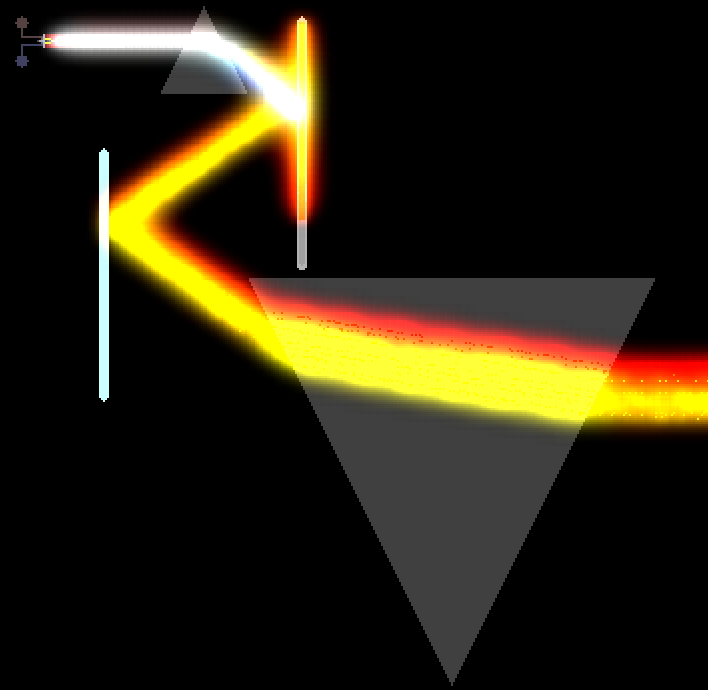
As a result, you can actually make just about any color you want if you know the right combination of element bounces will produce the color you need. Take Cracker64's tiny rainbow gun for example.
Other tricks
This is called total internal reflection, when light passes through something and bounces off of its inside. It's easy to do in TPT now, but the tricky part is finding the correct angle to make it happen with. Photons will generally get stuck TIR'ing inside of GLAS if random particles are dropped nearby, even though most of the photons will tend to escape.
GLOW particles now have a use besides looking pretty. They augment photons when they pass through them after a preset amount of time (about one second.) The newly created photons will appear to have a preset color, which depends on the exact temperature of the GLOW. It doesn't change the color of already-existing photons, however. It only adds colors to the photons it creates. When photons travel through GLOW, GLOW particles use life to determine how much longer until they can augment the photons again.
Combining BRMT, INSL and very specific temperatures of GLOW can have interesting effects.
Neutrons (NEUT), while not photons, are technically related now. Neutrons traveling through GLAS have a small chance of turning into/generating photons, which isn't immediately obvious due to how blue photons and blue neutrons now look effectively identical.
As an example in the above picture, there's a small chamber that contains glass on the left (which permits photons as well as neutrons) and activated liquid crystal on the right (which permits photons but reflects neutrons.)
So, by pouring neutrons into one end, photons come out the other end. This effect is called Cherenkov radiation.
And finally, photoelectricity. When photons touch PSCN which is touching NSCN, SPRK is created.
This new element, FILT, changes the colors of incoming photons depending on its temperature and other properties. The image here shows three different colors and the resulting photon colors. For more advanced usage of FILT, check Element:FILT.

